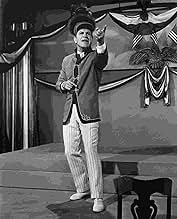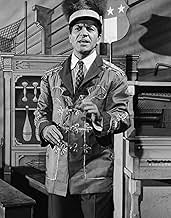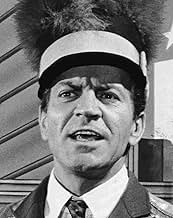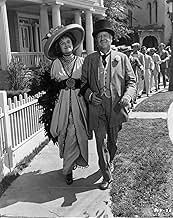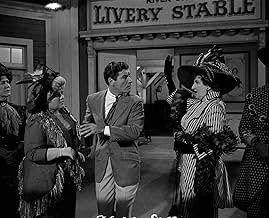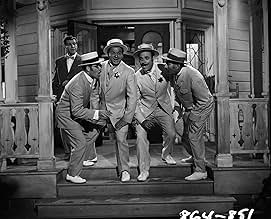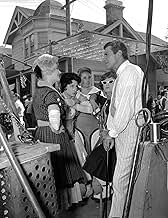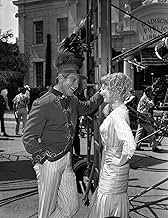Traveling con artist Harold Hill targets the naïve residents of a small town in 1910s Iowa by posing as a boys' band leader to raise money before he can skip town.Traveling con artist Harold Hill targets the naïve residents of a small town in 1910s Iowa by posing as a boys' band leader to raise money before he can skip town.Traveling con artist Harold Hill targets the naïve residents of a small town in 1910s Iowa by posing as a boys' band leader to raise money before he can skip town.
- Director
- Writers
- Stars
- Won 1 Oscar
- 6 wins & 12 nominations total
- Jacey Squires
- (as The Buffalo Bills)
- Winthrop Paroo
- (as Ronny Howard)
- Ewart Dunlop
- (as The Buffalo Bills)
- Olin Britt
- (as The Buffalo Bills)
- Oliver Hix
- (as The Buffalo Bills)
- Director
- Writers
- All cast & crew
- Production, box office & more at IMDbPro
Featured reviews
When he jumps train in River City to escape the wrath of an angry gathering of his peers, whom he has `Given a black eye' to in the territory, thanks to his dubious business practices, he sets about plying his trade on the good folks of middle America. But right out of the chute, he runs into some problems: The Mayor of River City, George Shinn (Paul Ford) wants his credentials, the lovely young local piano teacher and librarian, Marion (Shirley Jones), has her doubts about him, and he lacks an `angle,' something to convince the local citizenry of the need for a `boys band' to get them out of the trouble they're in-- even if there isn't any until he `creates' it.
One of his problems is solved when he runs into Marcellus Washburn (Buddy Hackett), a former shill of his, who mentions the new billiard table that just arrived in town. And that's all the Professor needs; because now they've got trouble, `With a capital T' that rhymes with P' and that stands for Pool'!' With that, he's up and running and he's got everything timed, right down to the `Last wave of the conductor's hand on the last train out of town.' Yee-gods and great honk! River City, Iowa, is about to have their very own boy's band.
Robert Preston gives the most memorable performance of his career as Hill, the silver-tongued salesman who can palaver past postulated proffered predicaments quicker'n an eggheaded egret's emblematized egression. It's just a matter of charm, style and timing, and Preston imbues Hill with em all, and more. He brings a mesmerizing presence to the screen in this role that is absolutely perfect; Preston IS Harold Hill, and he makes him his own in such a way that it's impossible to visualize anyone else in the role. It certainly gave Preston a chance to demonstrate his amazing versatility, and he really made the most of it, carving out a niche for himself in cinematic history.
The beautiful and talented Shirley Jones is terrific, as well, as `Marion the Librarian,' the young woman with a heart of gold who becomes a formidable opponent for Hill as he tries to charm his way past her suspicions of him. Jones personifies everything that is pure, moral and good, without being prudish, and it makes Marion a truly endearing character. And, like Preston, her performance is so good it's impossible to picture anyone else in the part. She's simply magnificent.
The made-to-order supporting cast includes a very young Ron Howard, unforgettable as Winthrop Paroo, Marion's little brother, Hermione Gingold (Eulalie Mackechnie Shinn), Pert Kelton (Mrs. Paroo), Monique Vermont (Amaryllis), Susan Luckey (Zaneeta), Timmy Everett (Tommy Djilas), Harry Hickox (Charlie) and Mary Wickes (Mrs. Squires). Featuring a number of memorable songs, including `76 Trombones,' `Till There Was You,' `Gary, Indiana' and of course the catchy `Trouble In River City' number, `The Music Man' is an uplifting, totally transporting film that makes the world seem like a pretty good place after all. This is the `Good Old Days' the way we'd like to think they really were, and it's all courtesy of the magic of the movies. I rate this one 10/10.
Its splendors have already been mentioned. I add two minor treats: 1) appearance of lanky character actor Hank Worden (of "The Searchers" and "Twin Peaks") as the undertaker, and 2) script so full of bizarre slang and expressions, it's as if P.G. Wodehouse or Damon Runyan were writing turn-of-the-century Americana.
My two carps are minor: I would have told Morton Da Costa to lose all the heavy-handed cutaways to the train wheels ("Rock Island") and chickens ("Pick a Little, Talk a Little") because we already got the point, and Ron Howard's cute lithp is a turn-off for me, but I never like cute kids. However, he's good at the climax, and when Shirley Jones hears him singing "Wells Fargo Wagon" and tears the evidence against Harold Hill out of the book (a librarian!), it's one of the most convincing turnarounds in musical history. Especially because she's still not fooled by the hucksterism, she just perceives it differently in comparison with the easily manipulated small-towners around her. She realizes that he's selling hope and joy despite himself ("There's always a band.") And when she just thanks him for his gift ("Till There Was You") and doesn't mind if he flees, of course he realizes he would be insane to leave. Another heartfelt turnaround.
One of the most graceful musicals, marked by blurring of the line between straight dialogue and songs--as the line "there was love all around but I never heard it singing" implies, you can hear the singing if you listen for it in the world. It's in the trains and the chickens and the bands you hear in your head and the pride in your children playing that clarinet by the "think system." Moving.
Did you know
- TriviaThe two songs "76 Trombones" and "Good Night My Someone" are the same tune, played in different tempos. Meredith Willson used this technique to present a masculine and feminine slant on the events surrounding Harold Hill's arrival in River City and his budding relationship with Marian.
- GoofsAs Harold makes his very first walk down Main Street after getting off the train, the hills in the background are at the far eastern end of the Santa Monica Mountains. Iowa is famously flat.
- Quotes
Marian Paroo: No, please, not tonight. Maybe tomorrow.
Harold Hill: Oh, my dear little librarian. You pile up enough tomorrows, and you'll find you've collected nothing but a lot of empty yesterdays. I don't know about you, but I'd like to make today worth remembering.
Marian Paroo: Oh, so would I.
- Crazy creditsThe closing credits appear in the style of a Broadway show's curtain call. First the minor characters are shown with the performers' names. The credits then progress through the cast ending with the lead.
- SoundtracksMain Title
(1957) (uncredited)
Music and Lyrics by Meredith Willson
Performed by Ray Heindorf and the Warner Bros. Studio Orchestra
Details
Box office
- Budget
- $4,240,000 (estimated)
- Runtime2 hours 31 minutes
- Color
- Aspect ratio
- 2.35 : 1
- 2.39 : 1
Contribute to this page



